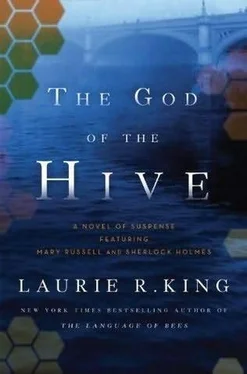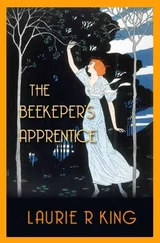“West is one of the young men Smith-Cumming brought in after the War, and I’d have thought him of too low a rank to possess that degree of ambition. In another twenty years, perhaps. His boss, Sinclair, would be more likely: Sinclair and Mycroft have never seen eye to eye on what constitutes the greatest threat to the empire, and he’s more than once expressed his disapproval of Mycroft’s parallel and, as Sinclair regards it, amateur Intelligence firm.
“I was rather surprised to see him at the funeral-and, looking less relieved than saddened. Sinclair has taken the widespread conviction that Germany was the ultimate evil and transferred it onto Russia. He maintains the Bolsheviks have to be crushed, instantly and forever, lest they penetrate to our very soul. Mycroft agrees to an extent, but refuses to permit the limitation of interests. Thus far, the powers-that-be have agreed that Mycroft possesses a balanced view, but this has only convinced Sinclair that Mycroft is deluded and obstructive.”
He stretched out an arm for a sterling cigarette case and gaudy glass ash-tray from Blackpool. When the stale cigarette was lit, he slid the case towards Goodman, who did not take it. We sat for a time, meditating on the ramifications of in-fighting among the branches of Intelligence.
“I have to agree,” I said at last, “this entire scheme is convoluted enough to be something Mycroft cooked up.”
“That would be a pleasant dream: my brother and his assistant, smoking cigars and moving pieces around a chessboard whilst his machinery turns.”
“We need to find him,” I said, stating the obvious.
“We need to find all of the missing pieces,” Holmes corrected me. “We need to have a word with Sosa’s mother, to see if he had a favourite refuge. And Brothers, who might be with one of the church’s Inner Circle.”
“I’d suggest we look for Mycroft first.”
“Agreed,” Holmes said. He put out his cigarette and fixed an eye on our guest. “Mr Goodman, where might you look for my brother?”
“At home,” the small man said promptly.
I winced, recalling the state in which I’d left Mycroft’s flat, but objected, “He wasn’t there yesterday.”
“All the more reason for him to be there today,” Holmes said.
Goodman came with us, of course. I could not see that he would either cause, or come to, harm, and although I thought for a moment that Holmes would request him to stay behind, he did not.
We went in through the St James’s Square entrance and followed Holmes’ bobbing candle in single-file through the narrow labyrinth. The faint cracks around the doorway indicated that the light was still on in the study, and Holmes slid the peep-hole aside that I might examine the room, comparing it with how we had left it.
I took my time, then stood back.
“I don’t see his gold pen on the desk-top. I’m pretty certain it was there Saturday.”
Goodman reached for the latch, but Holmes grabbed his wrist. I had to agree. “Robert, he’s right. Last time it only seemed to be a matter of arrest, but now there may be something more dangerous in there.”
“All the more reason,” he said, and before either of us could stop him, his other hand had worked the latch and he was putting his shoulder to the hidden door.
This time, I put my hand on Holmes’ arm.
We waited for this peculiar man to make a second leisurely survey of Mycroft’s flat. No shouts came, no gunshots. In a minute he was back, again holding an apple with a bite missing.
“Someone’s been here,” he commented indistinctly, then dropped into a chair, picking up an abandoned book from the nearby table.
Holmes shoved the door open, and I followed him inside.
At first, I could see no evidence of intrusion past the disorder I had myself left. Then: The chair I had used to prop under the door-handle was not as I remembered leaving it. Lestrade’s note, which I had left in case Holmes came here, lay at a different angle. And the bowl of fruit-surely there was more than one apple missing?
The sitting-room window made it imprudent to turn on those lights, but the kitchen had doors. I made my way there, let the doors swing shut, and switched on a small light.
Yes: Someone had been here since I searched the room the previous afternoon.
In a few minutes, Holmes’ voice came from without. “Was the revolver still in his bedside table when you were here yesterday?”
“Yes-is it missing now? Here-hold on a moment,” I said. I dimmed the light to let him in, then turned it on again. “The tea caddy is empty, an assortment of foodstuffs are missing, and the chair Mrs Cowper sits in has been moved a few inches. Also, the pills she puts on his tea-tray every morning? The bottles had more in them yesterday.”
He stared at me, then through me, a look I knew well. “What did you tell me about the key?”
“That Robert found? I merely speculated that the hiding of both key and letter-with the capital I on Interpreter -were intended to combine into a message that the key is in the interpreter. Or as it turned out, the key is the interpreter. Rather, his wife.”
The expression that dawned across Holmes’ face gave lie to his assertions of optimism. His face was transformed, and his eyes rose to the ceiling, as if thanking God. With an almost child-like glee, he rubbed his hands together as his gaze darted around the room, coming to rest on the royal portrait behind the housekeeper’s misplaced chair.
The dumbwaiter, the height of modern amenities when it was installed a generation ago, had proved more trouble than benefit for most of the building’s residents. Mycroft’s renovations this past year had included a panel screwed to the wall over its opening, but he had not blocked the hole entirely, merely hung over it Mrs Cowper’s portrait of His Majesty King George V.
Holmes jerked open the cutlery drawer for a knife, then crossed the room in three broad strides to attack the panel’s screws. Two turns of the wrist and a screw fell away. He bent to retrieve it, holding it out on his palm: The full-sized head was attached to a mere half-inch of shaft. The screw had been sawed off until it was no thicker than the panel.
All six screws had received the same treatment, and none of them had any function but appearance, but when he jabbed the silver blade under the edge of the panel, it did not give. And not, as I first thought, because it had been painted shut: The panel was held in place from the back.
At home, we could instantly lay our hands on a wide variety of tools suitable for burglary or architectural destruction, but Mycroft had never gone in for the practical side of his profession. Still, Mrs Cowper kept a well-equipped kitchen: I hoped I never had to explain to her what we had done to her meat mallet and butcher-knife.
Dish-towels and pot-holders helped muffle the sound of splintering wood, but we had to shut off the lights once to fetch a large pillow from the sitting room, and a second time when the inquisitive Goodman requested entrance.
Finally, the panel’s inner latches came free. Picking away the more vicious splinters, Holmes drew the torch from his pocket and put his head into the dark hole, twisting about to examine all angles.
When he stepped away, he looked as proud as ever a brother could be. He held out the torch, and I took his place.
Where there once would have dangled sturdy ropes joining the box to its pulley device at the top, there was now nothing but a dusty square shaft that reminded me of the emergency exits of some of the bolt-holes. Its roominess surprised me until I called to mind the box that travelled up and down: It had thick, insulated walls, and even then was big enough for…
I twisted about, as Holmes had done, and saw them: narrow boards, some ten inches apart, bolted to the wall beside the entrance and disappearing upwards into the gloom. It looked almost like-
Читать дальше












